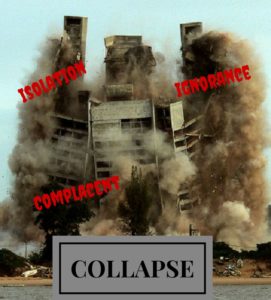It’s probably not coincidence that my mind goes to the idea of collapse with only one week left in school. The grasp on the students’ engagement and effort is quickly slipping.
Being aware of this and responding is the best way to prevent collapse. Avoiding reality will surely cause a crumble.
The reality is that we’re actually more vulnerable to collapse when we’re less aware of its possibility. All three of the signs of collapse revolve around awareness.
The Big Short
My wife and I took this movie in recently and I found it to be an historical event we can learn from. The Big Short is a perfect example of a monumental collapse. If you’re unfamiliar, it basically dramatizes four guys that boldly predicted the housing market collapse in 2008. The rest of the population developed the perception that the system was flawless, to the point where the banking business became blind to reality. The few outliers were regarded as crazy and ostracized for betting against the housing market. Now it’s obvious they were right, but why were these few so unbelievable at the time?
The nature of collapse is fascinating because it’s sudden with seemingly no warning. So is a collapse lurking in any facet of my life? Is the unpredictable knockout blow coming?
These outliers that were able to predict our economy’s crumble looked at the nature of the institution and noticed the market became something far different and disingenuous. What’s foundational about what you do? Are you remaining true to that foundation?
As usual I’ll relate this concept to education but I think it’s applicable to any situation.
3 Signs of Collapse
1.Ignora nce
nce
Well that is vague. The Big Short showed that in 2007 and 2008 the bankers didn’t even know what they were investing in. I’m worried the education system is growing ignorant, becoming indoctrinated by the statistics of formal assessments, forgetting the humans that our work revolves around. It’s been said that “public perception is reality.” I’ve heard this phrase used in response to testing scores and school district report cards. Basically supporting testing because these scores affect the community’s perception of the school. This is the exact mindset that allows for collapse. Why don’t we communicate clearly and vulnerably to our community the exact vision and implementation of education? Therefore they don’t just see the state’s judgement in flawed statistics.
2. Isolation
Much like ignorance, isolation is a personally chosen Utopian place.
Why don’t we communicate clearly and vulnerably? With technology’s advancements we’re in even greater danger of becoming isolated. The main reason behind the housing collapse was that the bankers became disconnected from their product. In education, we’re becoming disconnected from our product (the students). Sometimes we become so arrogant with our process that we can’t see reality. In isolation we have no accountability. To guard ourselves from isolation is to always be forthcoming with our vision and agenda.
It’s too easy for us to sit on our island of ideals; only taking in thoughts and feedback of an approved stance. I’m guilty of saying “Well I’m just going to close my door and teach,” avoiding any circumstance that I can’t control.
Oh, and it also requires the skill of listening. Listening to critique is tough, but monumentally important to avoiding collapse. The wisest are the ones that listen and consider.
3. Complacency
“Good enough.” It works and flows without hiccup. It’s become easy. Easy can be good, but that is not a reason to assume the process is being done correctly. Complacency is a clear signal that collapse is quickly arriving.
If nothing has been checked or changed in a while you’re being complacent and you’re avoiding confronting a potential defect. In my teaching practice my units and lesson plans from year to year have about a 50% turnover rate. It’s not that half of my instruction sucks (at least I hope not). It’s more that those 50% of the lessons had room for improvement or weren’t resonating with the current student. I’m constantly adjusting and changing things that don’t work. If you’re having success, find ways to creatively build on that momentum.
But, at the same time, I’m often too quick to drop the thing that doesn’t work. I find this to be a common struggle for the creative. They don’t feel their work is getting the response it should, therefore they drop it.
“If you think of this world as a place simply intended for our happiness, you find it quite intolerable: think of it as a place for training and correction and it’s not so bad.” Since hearing this perspective from C.S. Lewis I’ve begun to see life’s circumstances as opportunities for improvement.
Avoiding Collapse
As an optimist I’m naturally susceptible to these three signs of collapse. Honestly, we all are. We must hold on to our vision and beliefs while processing reality. I find where my ideals and reality meet, and act according to that intersection.
Peace in the process
